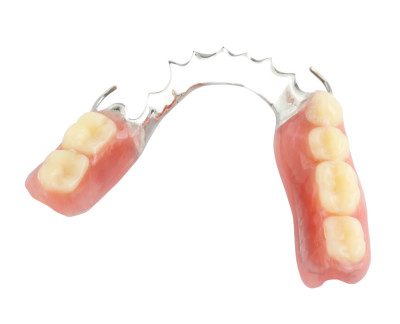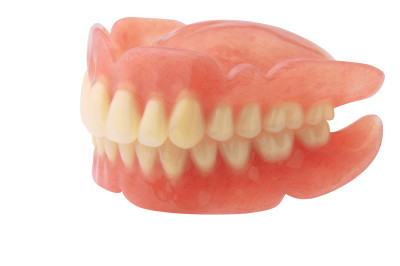Removable dentures
Removable partial dentures
A removable partial denture can replace one or more missing teeth. A partial denture is a framework (plate) with a number of false teeth on it. Removable partial dentures often have metal clasps to keep them in place, which might be visible. They must be removed and cleaned frequently in order to maintain oral hygiene as they can act as a food trap due to the extra bulk.
Removable full dentures
You will need removable full (or complete) dentures if you have no teeth left in your upper or lower jaw. They are usually made of a plastic plate with plastic or porcelain teeth. Full upper dentures cover the roof of your mouth (palate). A very thin layer of saliva between your palate and the denture creates suction, which keeps them firmly in position. Your facial muscles and tongue also help to keep them in place. Full lower dentures are often more difficult to keep in place because there is less support from your gums. It can be difficult to balance the denture against your cheeks and tongue. However, this should improve with time as you get used to it.
It’s very important to have realistic expectations of removable complete dentures. Getting used to them will take time and the length will depend on your adaptive capacity and neuromuscular control. Removable dentures will help you to eat, speak and smile confidently, but even the best dentures won’t feel the same as natural teeth. Your mouth may feel a bit sore and uncomfortable to start with, and review appointments will be needed for small adjustments. Your dentures should start to feel a bit more secure as you get used to them. It can take a while to get used to eating with new dentures, so it’s best to start with soft food. Try to use both sides of your mouth at the same time. This will help to keep your dentures in place. If, after an adjustment period, you still have problems with your dentures then dental implants might be indicated for you. The placement of 2-4 dental implants can significantly enhance the retention and feel of removable dentures.

Rehabilitation of smile and function with removable dentures
Looking after your dentures and mouth
Removable dentures require extra care and strict hygiene in order to keep them clean, as their larger size and surface is susceptible to food, debris and microbial biofilm accumulation. Poor hygiene may lead to decay and gum disease of any remaining teeth and even fungal infections of the mouth. Knowing how to modify your oral hygiene habits to best care for your restorations will help you maintain oral health for years to come:
- Brush any remaining teeth, using a fluoride toothpaste, two to three times each day for maximum effectiveness, always after you eat. Flossing is a key factor in removing debris and plaque from the teeth, and actually increases the lifespan of restorations and helps prevent tooth decay. You may have been prescribed to use fluoride as a mouth wash or gel, if you have been diagnosed as having a high risk for future decay. Avoid foods high in sugar and limit between-meal snacks to prevent cavities. It is important to clean your gums, tongue and the roof of your mouth with a soft brush. Limit consumption of coffee, soda, tea, etc. to keep your smile stain free.
- Clean your dentures after every meal using a soft toothbrush and liquid hand soap. It’s a good idea to brush them over a bowl of water or a towel to prevent damaging your dentures if you accidentally drop them. Ensure that you clean all the surfaces of your dentures, including the areas that sit against your gums. You can then soak them in a denture cleaning solution if you wish as this may help to remove any stains and reduce bacteria. Then brush your dentures again.
- If you have metal clasps or a soft lining on your denture, ask your dentist for advice before you use a denture cleaning solution. These are more delicate and can be damaged by cleaning solutions. Don’t soak your dentures in any type of bleach or very hot water, as this can weaken them and change their appearance.
- It’s important to take your dentures out at night to allow your mouth to rest. It can also help to prevent infections, such as fungal infections. Leave them in a glass of water overnight.
- If your dentures become worn or don’t fit properly, they can cause irritation and discomfort. Ideally you should have your dentures re-made before these problems arise. Even if you have no natural teeth left, it’s still important to have regular check-ups with your dentist. Your dentist will assess the fit of your dentures, and check for any problems or health issues.
- Finally, be sure to regularly attend your review and hygiene appointments.
Please visit the iSmile gallery for stories of patients who regained their confidence in smiling back using removable dentures! You may arrange for a consultation appointment so we can plan your new smile together.









